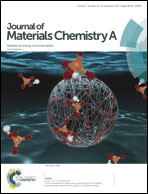Poly(phenylene sulfide sulfone) based membranes with improved stability for vanadium redox flow batteries†
Abstract
Herein, the use of sulfonated poly(phenylene sulfide sulfone) (sPSS) membranes as a possible solution to the stability issue of polyaromatic membranes in vanadium redox flow batteries is proposed. sPSS has been synthesized and compared with Nafion and sulfonated poly(ether ether ketone) (sPEEK) of a comparable degree of sulfonation. The membranes, prepared by solution casting, have been tested in terms of vanadium crossover and proton conductivity. The different diffusion profiles have been explained by thermoporometry, which shed light on the microstructure of the membranes under study. sPSS displayed the best combination of proton conductivity and permeability that resulted in a selectivity ratio about 3.5 times higher than those of sPEEK and Nafion. A degradation test in V5+, performed for 30 days under accelerated conditions, demonstrated a higher stability of sPSS with respect to sPEEK. The oxidation of the sulfide to sulphone occurred, but the molecular weight of the polymeric backbone was unaffected. In contrast, a significant decrease of the sPEEK molecular weight was detected at the end of the experiment. Finally, electrochemical tests exhibited a lower capacity loss after 50 cycles for sPSS as compared to those of Nafion and sPEEK, while the coulombic efficiencies of VRFBs around 95% did not undergo significant variations during the battery cycling.



 Please wait while we load your content...
Please wait while we load your content...